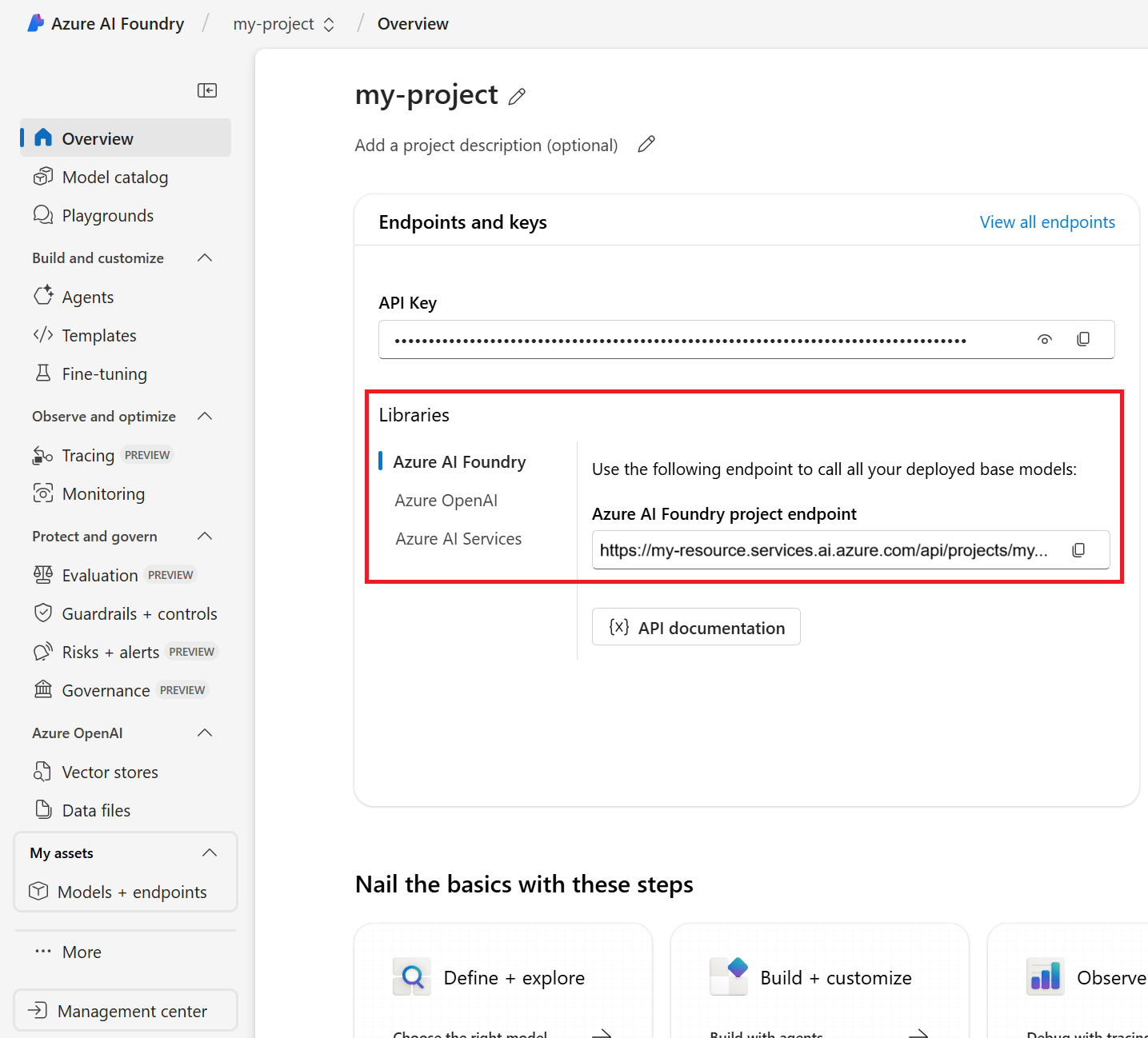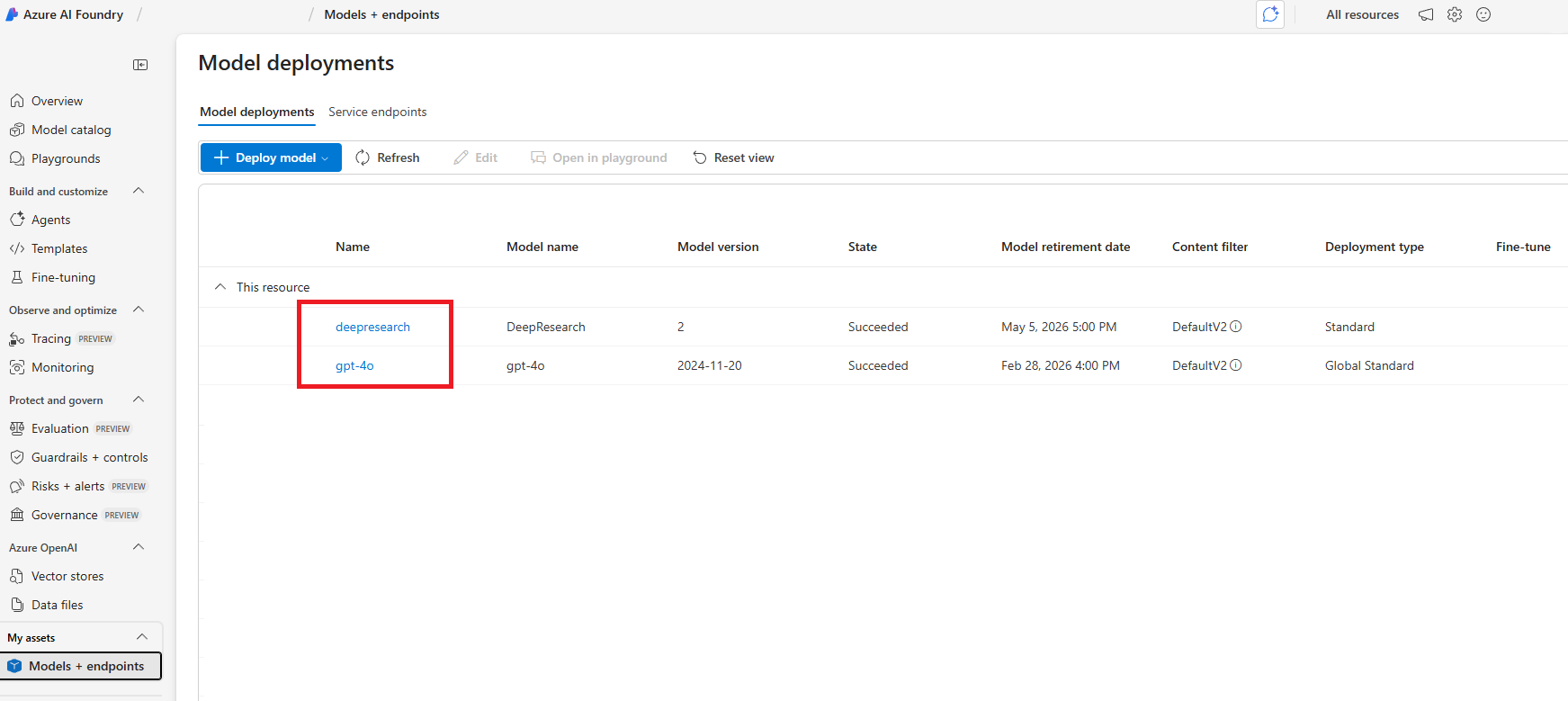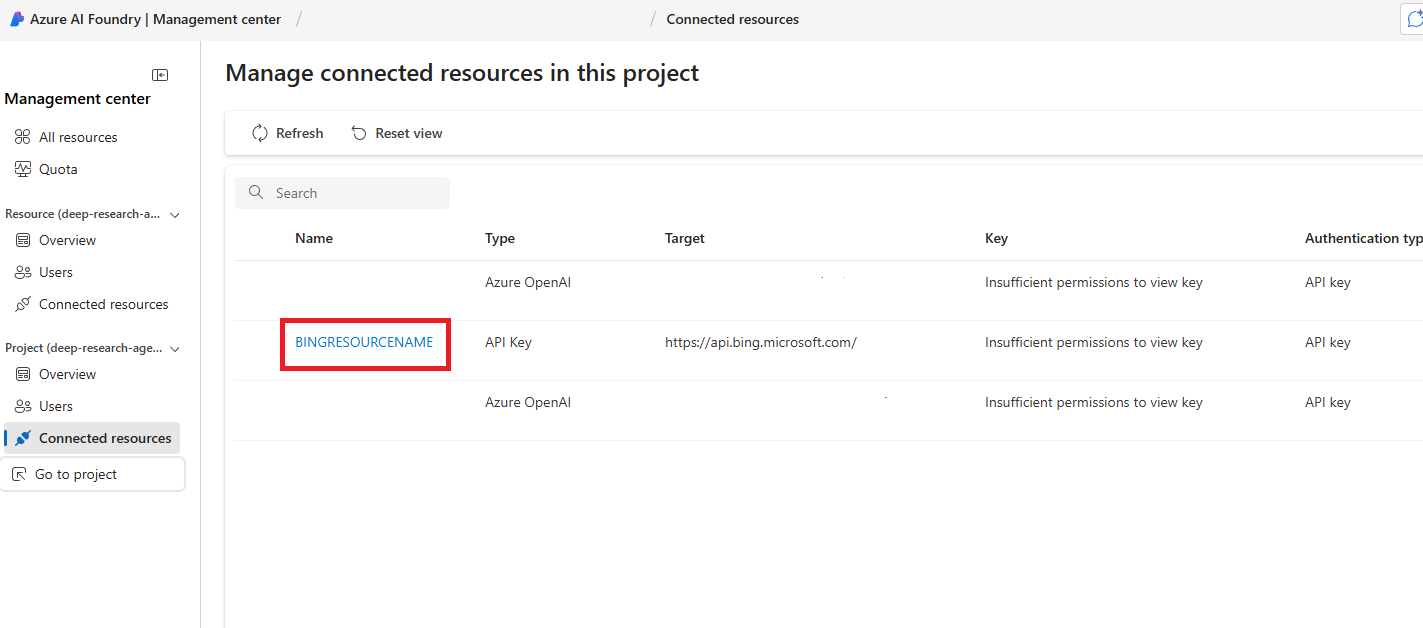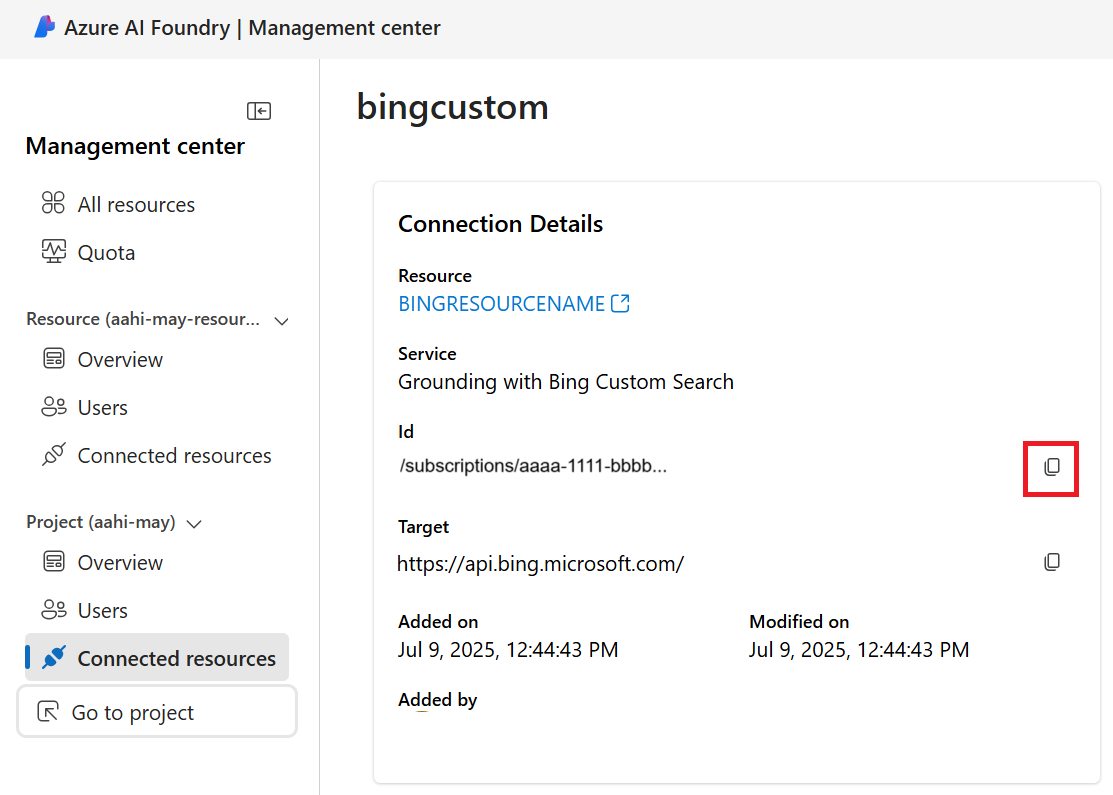Note
Access to this page requires authorization. You can try signing in or changing directories.
Access to this page requires authorization. You can try changing directories.
Note
- The
o3-deep-researchmodel is available for use only with the Deep Research tool. It is not available in the Azure OpenAI Chat Completions and Responses APIs. - The parent AI Foundry project resource and the contained
o3-deep-researchmodel and GPT models must exist in the same Azure subscription and region. Supported regions are West US and Norway East.
Use this article to learn how to use the Deep Research tool with the Azure AI Projects SDK, including code examples and setup instructions.
Prerequisites
The requirements in the Deep Research overview.
Your Azure AI Foundry Project endpoint.
You can find your endpoint in the overview for your project in the Azure AI Foundry portal, under Libraries > Azure AI Foundry.
Save this endpoint to an environment variable named
PROJECT_ENDPOINT.The deployment names of your
o3-deep-research-modelandgpt-4omodels. You can find them in Models + Endpoints in the left navigation menu.Save the name of your
o3-deep-researchdeployment name as an environment variable namedDEEP_RESEARCH_MODEL_DEPLOYMENT_NAMEand thegpt-4odeployment name as an environment variable namedMODEL_DEPLOYMENT_NAME.
Note
Other GPT-series models including GPT-4o-mini and the GPT-4.1 series are not supported for scope clarification.
The connection ID for your Grounding with Bing Search resource. You can find it in the Azure AI Foundry portal by selecting Management center from the left navigation menu. Then selecting Connected resources. Then select your bing resource.
Copy the ID, and save it to an environment variable named
AZURE_BING_CONECTION_ID.
Create an agent with the Deep Research tool
Note
You need version 1.1.0-beta.4 or later of the Azure.AI.Agents.Persistent package, and the Azure.Identity package.
using Azure;
using Azure.AI.Agents.Persistent;
using Azure.Identity;
using System.Collections.Generic;
using System.Text;
var projectEndpoint = System.Environment.GetEnvironmentVariable("PROJECT_ENDPOINT");
var modelDeploymentName = System.Environment.GetEnvironmentVariable("MODEL_DEPLOYMENT_NAME");
var deepResearchModelDeploymentName = System.Environment.GetEnvironmentVariable("DEEP_RESEARCH_MODEL_DEPLOYMENT_NAME");
var connectionId = System.Environment.GetEnvironmentVariable("AZURE_BING_CONECTION_ID");
PersistentAgentsClient client = new(projectEndpoint, new DefaultAzureCredential());
// DeepResearchToolDefinition should be initialized with the name of deep research model and the Bing connection ID,
// needed to perform the search in the internet.
DeepResearchToolDefinition deepResearch = new(
new DeepResearchDetails(
model: deepResearchModelDeploymentName,
bingGroundingConnections: [
new DeepResearchBingGroundingConnection(connectionId)
]
)
);
// NOTE: To reuse existing agent, fetch it with get_agent(agent_id)
PersistentAgent agent = client.Administration.CreateAgent(
model: modelDeploymentName,
name: "Science Tutor",
instructions: "You are a helpful Agent that assists in researching scientific topics.",
tools: [deepResearch]
);
//Create a thread and run and wait for the run to complete.
PersistentAgentThreadCreationOptions threadOp = new();
threadOp.Messages.Add(new ThreadMessageOptions(
role: MessageRole.User,
content: "Research the current state of studies on orca intelligence and orca language, " +
"including what is currently known about orcas' cognitive capabilities, " +
"communication systems and problem-solving reflected in recent publications in top thier scientific " +
"journals like Science, Nature and PNAS."
));
ThreadAndRunOptions opts = new()
{
ThreadOptions = threadOp,
};
ThreadRun run = client.CreateThreadAndRun(
assistantId: agent.Id,
options: opts
);
Console.WriteLine("Start processing the message... this may take a few minutes to finish. Be patient!");
do
{
Thread.Sleep(TimeSpan.FromMilliseconds(500));
run = client.Runs.GetRun(run.ThreadId, run.Id);
}
while (run.Status == RunStatus.Queued
|| run.Status == RunStatus.InProgress);
// We will create a helper function PrintMessagesAndSaveSummary, which prints the response from the agent,
// and replaces the reference placeholders by links in Markdown format.
// It also saves the research summary in the file for convenience.
static void PrintMessagesAndSaveSummary(IEnumerable<PersistentThreadMessage> messages, string summaryFilePath)
{
string lastAgentMessage = default;
foreach (PersistentThreadMessage threadMessage in messages)
{
StringBuilder sbAgentMessage = new();
Console.Write($"{threadMessage.CreatedAt:yyyy-MM-dd HH:mm:ss} - {threadMessage.Role,10}: ");
foreach (MessageContent contentItem in threadMessage.ContentItems)
{
if (contentItem is MessageTextContent textItem)
{
string response = textItem.Text;
if (textItem.Annotations != null)
{
foreach (MessageTextAnnotation annotation in textItem.Annotations)
{
if (annotation is MessageTextUriCitationAnnotation uriAnnotation)
{
response = response.Replace(uriAnnotation.Text, $" [{uriAnnotation.UriCitation.Title}]({uriAnnotation.UriCitation.Uri})");
}
}
}
if (threadMessage.Role == MessageRole.Agent)
sbAgentMessage.Append(response);
Console.Write($"Agent response: {response}");
}
else if (contentItem is MessageImageFileContent imageFileItem)
{
Console.Write($"<image from ID: {imageFileItem.FileId}");
}
Console.WriteLine();
}
if (threadMessage.Role == MessageRole.Agent)
lastAgentMessage = sbAgentMessage.ToString();
}
if (!string.IsNullOrEmpty(lastAgentMessage))
{
File.WriteAllText(
path: summaryFilePath,
contents: lastAgentMessage);
}
}
//List the messages, print them and save the result in research_summary.md file.
//The file will be saved next to the compiled executable.
Pageable<PersistentThreadMessage> messages
= client.Messages.GetMessages(
threadId: run.ThreadId, order: ListSortOrder.Ascending);
PrintMessagesAndSaveSummary([.. messages], "research_summary.md");
// NOTE: Comment out these two lines if you want to delete the agent.
client.Threads.DeleteThread(threadId: run.ThreadId);
client.Administration.DeleteAgent(agentId: agent.Id);
The name of your Grounding with Bing Search resource name. You can find it in the Azure AI Foundry portal by selecting Management center from the left navigation menu. Select Connected resources, then select your Grounding with Bing Search resource.
Copy the ID, and save it to an environment variable named
AZURE_BING_CONECTION_ID.Save this endpoint to an environment variable named
BING_RESOURCE_NAME.
Create an agent with the Deep Research tool
Note
You need the latest preview version of the @azure/ai-projects package.
import type {
MessageTextContent,
ThreadMessage,
DeepResearchToolDefinition,
MessageTextUrlCitationAnnotation,
} from "@azure/ai-agents";
import { AgentsClient, isOutputOfType } from "@azure/ai-agents";
import { DefaultAzureCredential } from "@azure/identity";
import "dotenv/config";
const projectEndpoint = process.env["PROJECT_ENDPOINT"] || "<project endpoint>";
const modelDeploymentName = process.env["MODEL_DEPLOYMENT_NAME"] || "gpt-4o";
const deepResearchModelDeploymentName =
process.env["DEEP_RESEARCH_MODEL_DEPLOYMENT_NAME"] || "gpt-4o";
const bingConnectionId = process.env["AZURE_BING_CONNECTION_ID"] || "<connection-id>";
/**
* Fetches and prints new agent response from the thread
* @param threadId - The thread ID
* @param client - The AgentsClient instance
* @param lastMessageId - The ID of the last message processed
* @returns The ID of the newest message, or undefined if no new message
*/
async function fetchAndPrintNewAgentResponse(
threadId: string,
client: AgentsClient,
lastMessageId?: string,
): Promise<string | undefined> {
const messages = client.messages.list(threadId);
let latestMessage: ThreadMessage | undefined;
for await (const msg of messages) {
if (msg.role === "assistant") {
latestMessage = msg;
break;
}
}
if (!latestMessage || latestMessage.id === lastMessageId) {
return lastMessageId;
}
console.log("\nAgent response:");
// Print text content
for (const content of latestMessage.content) {
if (isOutputOfType<MessageTextContent>(content, "text")) {
console.log(content.text.value);
}
}
const urlCitations = getUrlCitationsFromMessage(latestMessage);
if (urlCitations.length > 0) {
console.log("\nURL Citations:");
for (const citation of urlCitations) {
console.log(`URL Citations: [${citation.title}](${citation.url})`);
}
}
return latestMessage.id;
}
/**
* Extracts URL citations from a thread message
* @param message - The thread message
* @returns Array of URL citations
*/
function getUrlCitationsFromMessage(message: ThreadMessage): Array<{ title: string; url: string }> {
const citations: Array<{ title: string; url: string }> = [];
for (const content of message.content) {
if (isOutputOfType<MessageTextContent>(content, "text")) {
for (const annotation of content.text.annotations) {
if (isOutputOfType<MessageTextUrlCitationAnnotation>(annotation, "url_citation")) {
citations.push({
title: annotation.urlCitation.title || annotation.urlCitation.url,
url: annotation.urlCitation.url,
});
}
}
}
}
return citations;
}
/**
* Creates a research summary from the final message
* @param message - The thread message containing the research results
* @param filepath - The file path to write the summary to
*/
function createResearchSummary(message: ThreadMessage): void {
if (!message) {
console.log("No message content provided, cannot create research summary.");
return;
}
let content = "";
// Write text summary
const textSummaries: string[] = [];
for (const contentItem of message.content) {
if (isOutputOfType<MessageTextContent>(contentItem, "text")) {
textSummaries.push(contentItem.text.value.trim());
}
}
content += textSummaries.join("\n\n");
// Write unique URL citations, if present
const urlCitations = getUrlCitationsFromMessage(message);
if (urlCitations.length > 0) {
content += "\n\n## References\n";
const seenUrls = new Set<string>();
for (const citation of urlCitations) {
if (!seenUrls.has(citation.url)) {
content += `- [${citation.title}](${citation.url})\n`;
seenUrls.add(citation.url);
}
}
}
// writeFileSync(filepath, content, "utf-8");
console.log(`Research summary created:\n${content}`);
// console.log(`Research summary written to '${filepath}'.`);
}
export async function main(): Promise<void> {
// Create an Azure AI Client
const client = new AgentsClient(projectEndpoint, new DefaultAzureCredential());
// Create Deep Research tool definition
const deepResearchTool: DeepResearchToolDefinition = {
type: "deep_research",
deepResearch: {
deepResearchModel: deepResearchModelDeploymentName,
deepResearchBingGroundingConnections: [
{
connectionId: bingConnectionId,
},
],
},
};
// Create agent with the Deep Research tool
const agent = await client.createAgent(modelDeploymentName, {
name: "my-agent",
instructions: "You are a helpful Agent that assists in researching scientific topics.",
tools: [deepResearchTool],
});
console.log(`Created agent, ID: ${agent.id}`);
// Create thread for communication
const thread = await client.threads.create();
console.log(`Created thread, ID: ${thread.id}`);
// Create message to thread
const message = await client.messages.create(
thread.id,
"user",
"Research the current scientific understanding of orca intelligence and communication, focusing on recent (preferably past 5 years) peer-reviewed studies, comparisons with other intelligent species such as dolphins or primates, specific cognitive abilities like problem-solving and social learning, and detailed analyses of vocal and non-vocal communication systems—please include notable authors or landmark papers if applicable.",
);
console.log(`Created message, ID: ${message.id}`);
console.log("Start processing the message... this may take a few minutes to finish. Be patient!");
// Create and poll the run
const run = await client.runs.create(thread.id, agent.id);
let lastMessageId: string | undefined;
// Poll the run status
let currentRun = run;
while (currentRun.status === "queued" || currentRun.status === "in_progress") {
await new Promise((resolve) => setTimeout(resolve, 1000)); // Wait 1 second
currentRun = await client.runs.get(thread.id, run.id);
lastMessageId = await fetchAndPrintNewAgentResponse(thread.id, client, lastMessageId);
console.log(`Run status: ${currentRun.status}`);
}
console.log(`Run finished with status: ${currentRun.status}, ID: ${currentRun.id}`);
if (currentRun.status === "failed") {
console.log(`Run failed: ${currentRun.lastError}`);
}
// Fetch the final message from the agent and create a research summary
const messages = client.messages.list(thread.id, { order: "desc", limit: 10 });
let finalMessage: ThreadMessage | undefined;
for await (const msg of messages) {
if (msg.role === "assistant") {
finalMessage = msg;
break;
}
}
if (finalMessage) {
createResearchSummary(finalMessage);
}
// Clean-up and delete the agent once the run is finished
await client.deleteAgent(agent.id);
console.log("Deleted agent");
}
main().catch((err) => {
console.error("The sample encountered an error:", err);
});
The name of your Grounding with Bing Search resource name. You can find it in the Azure AI Foundry portal by selecting Management center from the left navigation menu. Then select Connected resources.
Save this endpoint to an environment variable named
BING_RESOURCE_NAME.
Create an agent with the Deep Research tool
The Deep Research tool requires the latest prerelease versions of the azure-ai-projects library. First we recommend creating a virtual environment to work in:
python -m venv env
# after creating the virtual environment, activate it with:
.\env\Scripts\activate
You can install the package with the following command:
pip install --pre azure-ai-projects
import os, time
from typing import Optional
from azure.ai.projects import AIProjectClient
from azure.identity import DefaultAzureCredential
from azure.ai.agents import AgentsClient
from azure.ai.agents.models import DeepResearchTool, MessageRole, ThreadMessage
def fetch_and_print_new_agent_response(
thread_id: str,
agents_client: AgentsClient,
last_message_id: Optional[str] = None,
) -> Optional[str]:
response = agents_client.messages.get_last_message_by_role(
thread_id=thread_id,
role=MessageRole.AGENT,
)
if not response or response.id == last_message_id:
return last_message_id # No new content
print("\nAgent response:")
print("\n".join(t.text.value for t in response.text_messages))
for ann in response.url_citation_annotations:
print(f"URL Citation: [{ann.url_citation.title}]({ann.url_citation.url})")
return response.id
def create_research_summary(
message : ThreadMessage,
filepath: str = "research_summary.md"
) -> None:
if not message:
print("No message content provided, cannot create research summary.")
return
with open(filepath, "w", encoding="utf-8") as fp:
# Write text summary
text_summary = "\n\n".join([t.text.value.strip() for t in message.text_messages])
fp.write(text_summary)
# Write unique URL citations, if present
if message.url_citation_annotations:
fp.write("\n\n## References\n")
seen_urls = set()
for ann in message.url_citation_annotations:
url = ann.url_citation.url
title = ann.url_citation.title or url
if url not in seen_urls:
fp.write(f"- [{title}]({url})\n")
seen_urls.add(url)
print(f"Research summary written to '{filepath}'.")
project_client = AIProjectClient(
endpoint=os.environ["PROJECT_ENDPOINT"],
credential=DefaultAzureCredential(),
)
conn_id = project_client.connections.get(name=os.environ["BING_RESOURCE_NAME"]).id
# Initialize a Deep Research tool with Bing Connection ID and Deep Research model deployment name
deep_research_tool = DeepResearchTool(
bing_grounding_connection_id=conn_id,
deep_research_model=os.environ["DEEP_RESEARCH_MODEL_DEPLOYMENT_NAME"],
)
# Create Agent with the Deep Research tool and process Agent run
with project_client:
with project_client.agents as agents_client:
# Create a new agent that has the Deep Research tool attached.
# NOTE: To add Deep Research to an existing agent, fetch it with `get_agent(agent_id)` and then,
# update the agent with the Deep Research tool.
agent = agents_client.create_agent(
model=os.environ["MODEL_DEPLOYMENT_NAME"],
name="my-agent",
instructions="You are a helpful Agent that assists in researching scientific topics.",
tools=deep_research_tool.definitions,
)
# [END create_agent_with_deep_research_tool]
print(f"Created agent, ID: {agent.id}")
# Create thread for communication
thread = agents_client.threads.create()
print(f"Created thread, ID: {thread.id}")
# Create message to thread
message = agents_client.messages.create(
thread_id=thread.id,
role="user",
content=(
"Give me the latest research into quantum computing over the last year."
),
)
print(f"Created message, ID: {message.id}")
print(f"Start processing the message... this may take a few minutes to finish. Be patient!")
# Poll the run as long as run status is queued or in progress
run = agents_client.runs.create(thread_id=thread.id, agent_id=agent.id)
last_message_id = None
while run.status in ("queued", "in_progress"):
time.sleep(1)
run = agents_client.runs.get(thread_id=thread.id, run_id=run.id)
last_message_id = fetch_and_print_new_agent_response(
thread_id=thread.id,
agents_client=agents_client,
last_message_id=last_message_id,
)
print(f"Run status: {run.status}")
print(f"Run finished with status: {run.status}, ID: {run.id}")
if run.status == "failed":
print(f"Run failed: {run.last_error}")
# Fetch the final message from the agent in the thread and create a research summary
final_message = agents_client.messages.get_last_message_by_role(
thread_id=thread.id, role=MessageRole.AGENT
)
if final_message:
create_research_summary(final_message)
# Clean-up and delete the agent once the run is finished.
# NOTE: Comment out this line if you plan to reuse the agent later.
agents_client.delete_agent(agent.id)
print("Deleted agent")
Note
Limitation: The Deep Research tool is currently recommended only in nonstreaming scenarios. Using it with streaming can work, but it might occasionally time out and is therefore not recommended.



